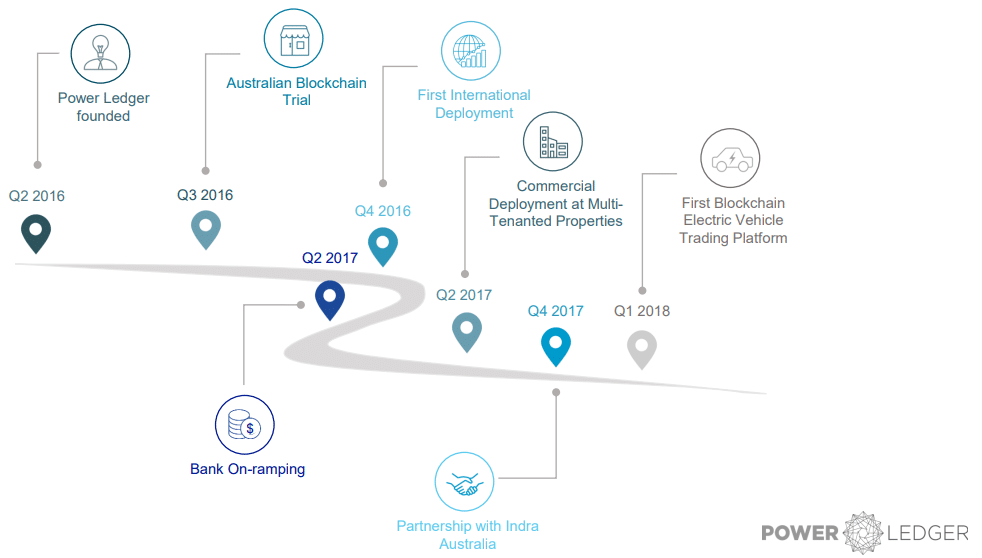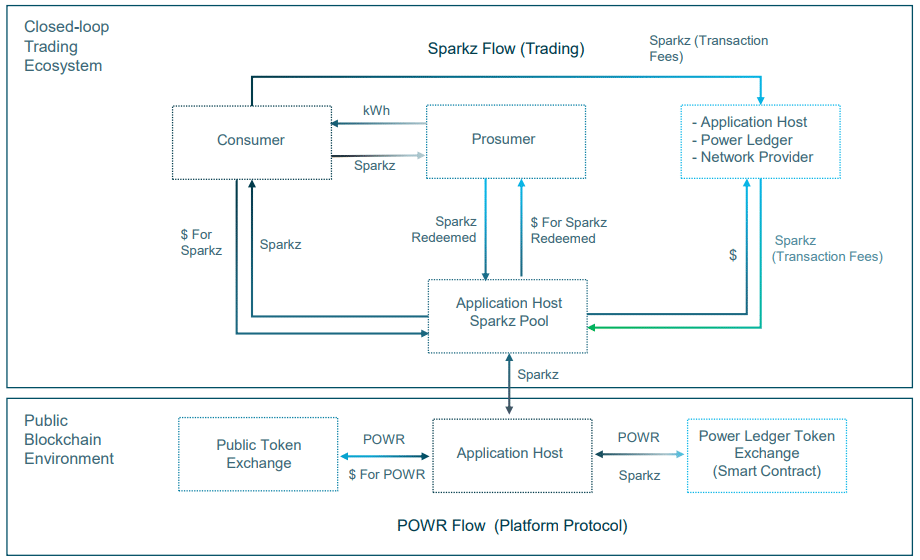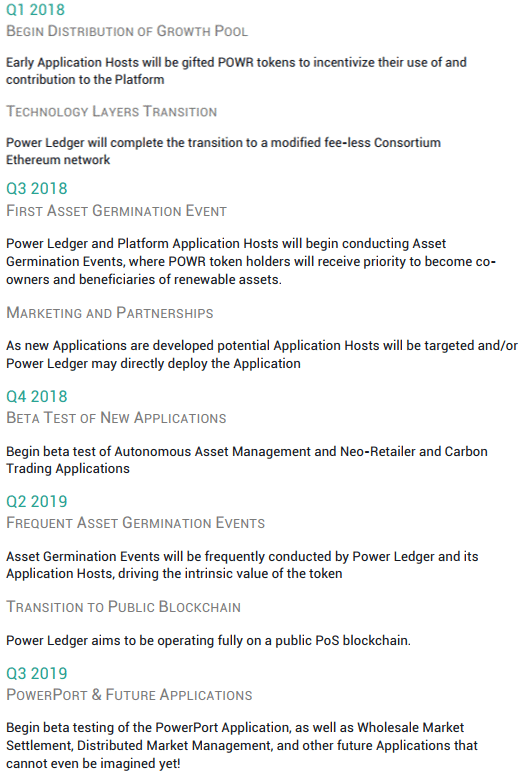Latest news about Bitcoin and all cryptocurrencies. Your daily crypto news habit.
What is Power Ledger?
Imagine a world without reliance on big utility companies or foreign resources for all the energy needed to run your life. That world may become a reality in the near future in thanks to Power Ledger’s decentralized applications. Power Ledger, a blockchain-based platform, plans to completely revolutionalize the worldwide energy industry by enabling local areas the ability to sell and distribute solar power to its neighbors without the need of a middleman.
In a 2015 report, Deutsche Bank stated that at least thirty countries worldwide have already reached grid parity: the state where the price of solar-generated electricity was equal or less than the cost of local retail electricity. Combining innovations in both solar power and blockchain development, Power Ledger offers an unmatchable energy solution that is cleaner, cheaper, and more sustainable than traditional energy alternatives.
Company History & Accomplishments
Power Ledger was created to address three major challenges that face the global energy system:
- Include individuals living in high-density housing in the distributed energy economy
- Change electricity networks to make an incentive for the connection of DERs (Decentralized Energy Resources)
- Mitigate the risk of connecting billions of dollars in network assets.
Achievement Timeline
Founded in May 2016, Power Ledger has accomplished some significant milestones in a short period. In August 2016, Power Ledger developed and trialed Australia’s first energy trading blockchain network. Shortly after, Power Ledger made its first international deployment by enabling its peer-to-peer blockchain-based energy trading platform across a distribution network in New Zealand.
In the 2nd quarter of 2017, Power Ledger developed and deployed a commercial energy management system that allowed the transparent distribution of locally generated renewable energy to tenants in multi-unit departments. Most recently, Power Ledger has successfully incorporated pay for use solar-powered electric vehicle charging units into various Australian developments.
Power Ledger Overview
The Power Ledger Platform forms peer-to-peer energy transactions by recording both the generation and consumption of all platform participants in real time. Energy generation and use are transacted at predetermined rates.
How Does Power Ledger Ecosystem Work?
The Power Ledger Platform operates on two blockchain layers and uses two coins: The Power Ledger Token (POWR) and Sparkz. POWR and Sparkz are both used with the system and have different functions on both blockchains. (Power Ledger uses the public Ethereum blockchain as well as a private consortium blockchain)
Power Ledger Token
Power Ledger Tokens allow Application Hosts and Participants access to use the platform. If an Application Host does not have a sufficient number of POWR, it will not be able to access the platform. In the system, POWR will be traded and put into escrow via an Ethereum Smart Bond exchange for Sparkz.
Once an Application Host has escrowed enough of its Power Ledger Tokens, it can no longer transact on the platform until it obtains a sufficient number of POWR to provide access. After an Application Host returns Sparkz to the platform, the Ethereum Smart Bond will be unlocked. Then, previously escrowed POWR will be returned to the Application Host.
Sparkz
Sparkz is purchased and redeemed using fiat currencies within individual trading platforms that have closed-loop exchanges for energy and Sparkz. Sparkz tokens are used by the Application Host to onboard its customers. Essentially, Customers pay money for Sparkz, which are then used to trade for electricity.
Platform Applications
Power Ledger supports a wide array of energy trading applications. Some application classes are already operational while others are still in development.
Fully Developed Applications
- P2p Trading – Allows consumers to trade electricity with one another and receive payment in real-time in an automated and transparent settlement system.
Built Applications
- Electric Vehicle Trading – Facilities accumulation of real-time metering data, user identification, transaction settlements for electric vehicles.
- Neo-retailer – Provides retailers with smart demand and supply management logistics while managing consumer risk of non-supply.
- Autonomous Asset Management – Allows for shared ownership of renewable energy assets and trading renewable asset ownership.
- MicroGrid Operator – Enables electricity metering, big data acquisitions, and grid management at unprecedented granular scale.
Applications Still Under Development
- Carbon Trading – Offers smart contracts for carbon traders to assure digital transactions across organizations.
- Power Port – Allows assets to be automated via the platform and can provide a mobile storage discharge facility maintaining supplies for self-sufficient energy consumers.
- Distributed Market Management – Enables the optimization of network assets by providing metering data, the collection of big data, and network load management.
- Transmission Exchange – Provides a collection of metering information and big data for transmission networks.
- Wholesale Market Settlement – Enables rapid, low-cost settlement and data optimization for wholesale energy marketplaces.
Benefits of Power Ledger
Power Ledger officially lists six benefits of its ecosystem:
- Improved economics for solar energy creation and battery storage
- Fixes the split-incentive problem with multi-tenanted properties
- Increases the utilization and value of network assets
- Easier access low-cost renewable electricity
- Decreases wastage of electricity in transmission
- Provides a platform for community-owned generation or storage
Power Ledger’s Dual Token System
Two tokens are used within Power Ledger’s System: Power Tokens (POWR) and Sparkz. There are major differences between the supply and pricing of both these coins.
Token Supply
Power Token Supply- The total amount of Power Tokens is fixed at 1,000,000,000. The currently available supply is 363,810,715.
Sparkz Supply- The total amount is unfixed. Sparkz will be generated as they are required, used, and then destroyed when redeemed.
Pricing
Power Token Price- Determined entirely by cryptocurrency exchanges. The market can push or pull the price of Power Token up or down.
Sparkz Price- Tethered to a local government’s fiat currency and cost of power. For instance, in Australia one Sparkz would be equal to one Australian Dollar (AUD).
The price of Sparkz should remain quite stable as it’s pegged to a government-issued currency. There will be different blockchains created for each different local currency to allow multiple fiat currencies throughout the world to participate in the Power Ledger ecosystem at different prices.
Planned POWR Token Distribution
- 35% – Sold to Presale and ICO Investors
- 25% – Incentivize Users
- 15% – Escrowed Developer’s Pool
- 25% – Company Reserve
Where can you buy POWR Tokens?
Nine cryptocurrency exchanges currently list POWR:
Where to store POWR Tokens?
As an ERC20 Token, Power Ledger tokens must be stored in a wallet with ERC20 support. One of the most popular Ethereum software wallets is MyEtherWallet.
Providing better security than software wallets, hardware wallets provide the safest method for prudent investors to store owned cryptocurrency. The most two popular hardware wallets are the Ledger Nano S and Trezor. Designed with ERC20 support, both the Ledger Nano S and Trezor can store Power Ledger tokens.
The Power Ledger Team
Power Ledger’s team has immense expertise in both blockchain and electricity markets. They’re comprised of six Board of Directors in addition to over ten full time-team members.
Board of Directors
Power Leger’s five co-founders make up five of the six Board of Director seats of the company. The sixth board seat belongs to venture capitalist Bill Tai.
Bill Tai – Board Advisor
Receiving his MBA from Harvard, Yai is a world-renowned venture capitalist. Tai’s experience is quite extensive; he is currently the Chairman of Treasure Data and also a Board Member of Bitfury and Boxer.
Tai has severed as a Board Director of seven publicly listed companies that have grown from startups that he funded. Also, Tai is part of the World Economic Forum’s Technology Pioneer Committee and is an Adjunct Professor at Curtin University.
Dr. Jemma Green – Chair & Co-founder
Green provides strategic external relations, risk management, and leadership development for Power Ledger. She has a finance career that spans over fifteen years highlighted with eleven years of investment banking experience. She also has her Ph.D. in Disruptive Innovation.
In addition to roles at Power Ledger, Green is also a research fellow at Curtin University Sustainability Policy Institute. Green’s doctoral research is tied closely to Power Ledger’s goals to increase multi-unit development participation in the renewable energy economy.
David Martin – Managing Director & Co-founder
Martin conducts daily operations and commercialization of Power Ledger’s technology. Martin’s primary focus is to gain acceptance of Power Ledger’s peer to peer trading system as well as acquire need regulatory reforms for the democratization of the platform.
Martin has a wide range experience that is spotlighted by his twenty-year career in the electricity industry. He has held executive positions in two State-owned electricity utility firms as well as been senior energy industry consultant for over six years.
John Bulich – Technical Director & Co-founder
Leading the technical team, Bulich heads application design and development for Power Ledger. He also directs Power Ledger’s strategic direction. In addition to his roles responsibilities at Power Ledger, Bulich is also a director and co-founder of Ledger Assets, a leading Australian blockchain development firm.
Dr. Gov van Ek – Director & Co-founder
Ek manages and directs technical development for Power Ledger. He has been managing director of multiple private and public companies. Additionally, Ek co-founded Ledger Assets, a leading Australian blockchain development firm.
Ek also has his Ph.D. from the University of Manchester in Total Technology. Throughout his career, Ek has developed an expertise computer interface design as well as artificial intelligence.
Jenni Conroy – Director & Co-founder
Conroy serves multiple functions at Power Ledger. Not only is she the company’s secretary, but she also manages regulatory and business services for the company. Assisting in product development for Power Ledger’s Platform, Conroy has more than thirty years experience in the energy industry.
Outside of Power Ledger, Conroy is the owner of Future Effect, an energy sector consulting firm. She also holds Masters Degrees in both Business and Commerical Law.
Other Notable Team Members
Fundraising and Trading
Power Ledger’s POWR Presale sold out in just three days and raised over thirteen million dollars (AUD) in exchange for 190,000,000 tokens. After the presale, Power Ledger held an ICO to sell the remaining 160,000,000 POWR tokens allocated to Token Generation Event. After both rounds, funds raised totaled thirty-four million dollars (AUD).
In addition to money raised from its presale and ICO, the Australian Government also awarded Power ledger a grant for 8 million dollars (AUD) to develop its technology and concept further. (Australia has one of the highest costs of electricity in the world and thus has a large stake in the overall success the company)
After its Token Generation Event, Power Ledger began trading on exchanges November 1st, 2017 for 10 roughly cents. Since hitting exchanges, POWR had an impressive short-term bull run reaching an all-time high of $2.01 in the first week of January.
Since reaching its all-time high, the price of POWR quickly fell to 80 cents before stabilizing to prices right below one dollar (USD) the last week of January. At the time of writing, the price of Power Ledger has dipped further to 40 cents. POWR’s 2018 negative price movement has been highly correlated to Bitcoin’s massive downswing since the new year.
baseUrl = "https://widgets.cryptocompare.com/";
var scripts = document.getElementsByTagName("script");
var embedder = scripts[ scripts.length - 1 ];
(function (){
var appName = encodeURIComponent(window.location.hostname);
if(appName==""){appName="local";}
var s = document.createElement("script");
s.type = "text/javascript";
s.async = true;
var theUrl = baseUrl+'serve/v3/coin/chart?fsym=POWR&tsyms=USD,EUR,CNY,GBP';
s.src = theUrl + ( theUrl.indexOf("?") >= 0 ? "&" : "?") + "app=" + appName;
embedder.parentNode.appendChild(s);
})();
Future Projects and Roadmap
Power Ledger has given a detailed list of goals for the next two years. They have already signed an agreement to bring its technology to Europe in 2019; the Liechtenstein Institute for Strategic Development will become the first European Application Host to use Power Ledger’s peer-to-peer energy trading platform in Europe.
Additionally, Power Ledger finished multiple agreements that will bring its platform to Asia in the next year as well. Thai renewable energy developer, BCPG, and Power Ledger have recently come to a deal to bring peer-to-peer energy trading to Thailand; Indian based Mahindra has also closed a deal to implement Power Ledger’s to settle Microgrid transactions.
Power Ledger’s upcoming goals from its whitepaper:
Conclusion
Power Ledger provides a blockchain-based marketplace that can truly change the world. Taking power away from large energy companies, Power Ledger gives local communities the ability to sell their excess solar power to neighbors. Power Ledger has created an energy distribution and tracking platform that allows consumers buy carbonless, sustainable energy at lower prices than what’s offered by traditional electric companies.
Power Ledger has plans to expand its operations to three continents worldwide and has amassed an army of powerful strategic partners to help achieve its goals. With the planned release of multiple applications for its platform in the immediate future, the project has positioned itself to disrupt multiple energy markets throughout the world creating a bright future for all participants involved in this green revolution.
The post What is Power Ledger (POWR)? | Beginner’s Guide appeared first on CoinCentral.
Disclaimer
The views and opinions expressed in this article are solely those of the authors and do not reflect the views of Bitcoin Insider. Every investment and trading move involves risk - this is especially true for cryptocurrencies given their volatility. We strongly advise our readers to conduct their own research when making a decision.










